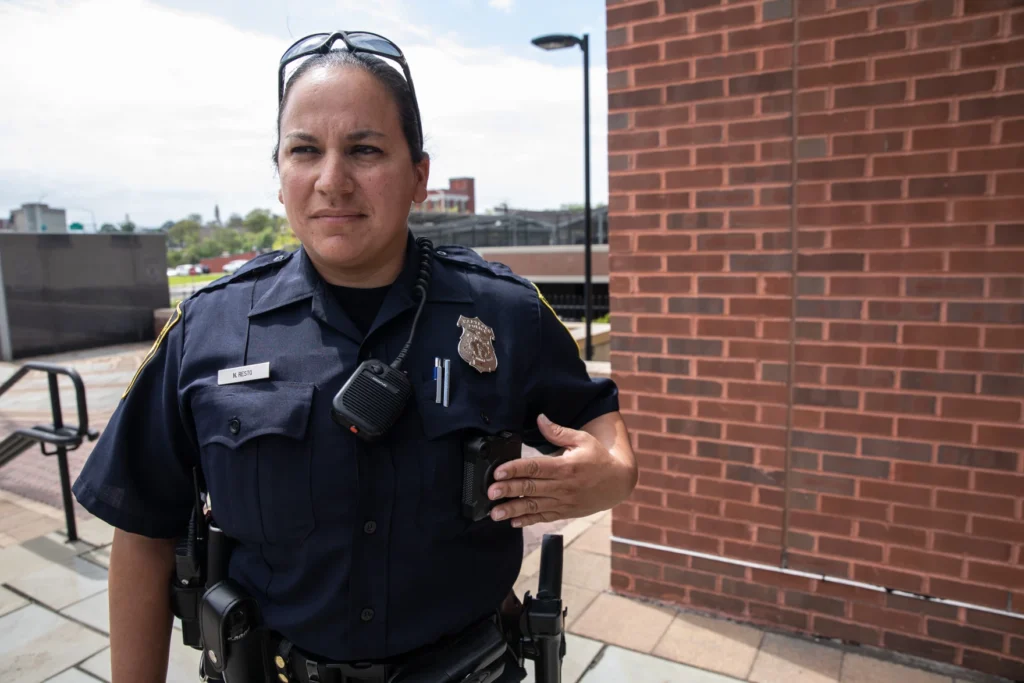2019

Defendants oppose the 2018 motion for contempt.115 Succeeding Judge Burns, Judge Vanessa Bryant now presides over the case. Like Burns, Bryant broke racial and gender barriers when she became the first Black woman appointed to a federal court in New England.116 Judge Bryant denies plaintiffs’ motion as premature because the parties had not yet exhausted their mediation sessions with Judge Margolis as Attorney Schulman had submitted the motion too early. The 2010 Agreement ordered that the plaintiffs would use contempt as a last resort following mediation regarding compliance issues.117 The parties conduct more mediation sessions with Judge Margolis and are able to resolve most of their disagreements.118
After a complaint by Officer Kelly Baerga is ignored for nine month, the HPD revamps its procedures investigating internal sexual harassment allegations. Baerga describes a “good ol’ boys” culture within the department that contributed to discriminatory treatment as well as her superiors’ lack of response.119 Faced with pressure from Hartford residents, the city hires a labor relations firm to accelerate pending and future sexual harassment investigations. They also change the review process to include the mayor’s chief of staff. Like many police departments nationwide, the HPD tends to be most receptive to criticism when it poses a public relations problem, a pattern evident throughout the history of Cintron, suggesting some limitations of judicially imposed reform. Moreover, the adversarial mode of litigation does not incentivize reflexivity on the part of the department, but rather tends to place the onus for change on the plaintiff’s counsel and their ability to argue against the city’s robust legal team. The department learns that it only has to institute reforms when its norms are viewed by a judge or the press as abnormal. The change spurred by Officer Baerga’s complaint would hardly imply a promise of future vigilance regarding the department’s internal culture, and indeed can be seen as harkening back to past claims of discrimination within the force, such as those brought by the Guardians in 1970 and in 1981.
The Hartford Courant reports on systemic problems in the state investigation process for killings committed by officers. Connecticut law requires that cases of deadly force be investigated by state police detectives, who pass their findings onto a state’s attorney to decide whether criminal charges should be filed. As Nicholas Rondinone of the Courant reports, between 2008-2019, Hartford State’s Attorney Gail P. Hardy has failed to resolve five investigations into such deaths.120 Hardy blames the situation on the jurisdiction’s overload of cases and that she is too busy. This degree of delay can easily lead to an automatic acquittal: “The investigations … fall outside the statute of limitations for a number of criminal offenses a prosecutor could ask state police to pursue if they found the actions were unlawful.”121 In deadly force cases, Hardy has generally ruled in favor of the committing officer. Nonetheless, were she to find them guilty of any form of misconduct, the officer would still face fewer consequences than they would from a punctual investigation. Although murder has no statute of limitations, the state’s attorney must begin their prosecution for most felonies within five years after the occurrence, and within one year for misdemeanors.122 David McGuire, the executive director of Connecticut’s ACLU, expresses outrage at Hardy’s delays, which are indicative of a wider culture of disregard and lack of constitutional protections for police violence victims and their families: “It’s not only justice delayed, it’s justice denied,” McGuire said. “It’s a case where prosecutors, who know the criminal statute of limitations … are knowingly running the clocks out. Even if they found the force was not justified, they would have no ability to charge the officer. It’s deeply troubling and problematic on many levels.”123 Although Cintron has no jurisdiction over the actions of state’s attorneys such as Hardy, the issue is still very much in conversation with the intention of officer accountability built into the consent decree.
Notes
115. Defendants’ Opposition to Motion for Contempt, Cintron, et al v. Vaughn, et al, 3:69-cv-13578-KAD (D. Conn.
January 11, 2019).
116. Robert Storace, “Meet Judge Vanessa Bryant, a Trailblazer Who Learned to Be a Model of Resilience,”
Connecticut Law Tribune, November 6, 2020.
117. Memorandum of Decision on Plaintiffs’ Motion for Contempt, Cintron, et al v. Vaughn, et al,
3:69-cv-13578-KAD (D. Conn. July 19, 2019)
118. Defendants’ Opposition to Motion for Contempt, Cintron, et al v. Vaughn, et al, 3:69-cv-13578-KAD (D. Conn.
October 31, 2022).
119. Jenna Carlesso, “Firm to Aid with Sexual Harassment Complaints; Mayor: Hartford Changing Policies,” Hartford
Courant, February 22, 2019. ProQuest.
120. Nicholas Rondinone, “Cases Still Unresolved: Hartford State’s Attorney has yet to Rule on Five Deadly Police
Use-of-Force Probes,” Hartford Courant, October 25, 2019. ProQuest.
121. Ibid.
122. James Orlando, “Statute of Limitations for Prosecutions,” Office of Legislative Research, October 8, 2019. url.
123. Ibid.
